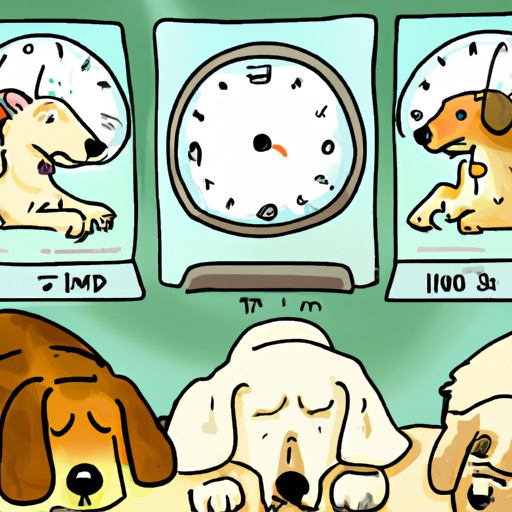Understanding The Sleep Cycle of Dogs
Just like you, your four-legged friend follows a sleep cycle. However, the sleep pattern of dogs is quite different from ours. While we humans usually have a long, uninterrupted sleep, dogs have multiple short bouts of sleep throughout the day. They are polyphasic sleepers, meaning they sleep multiple times in a 24-hour period.
Here’s a rough breakdown of a dog’s sleep cycle:
- Light Sleep: This is similar to our stage of light sleep where dogs can be easily awakened. Their body is relaxed, but their brain is still somewhat active.
- Deep Sleep: In this stage, the dog’s brain activity decreases, and they start to dream.
- REM Sleep: This is the stage where most of the dreaming occurs, and dogs may twitch, move their paws, or even bark in their sleep.
Factors That Influence a Dog’s Sleep
The amount of sleep a dog needs can vary based on several factors.
- Age: Puppies and older dogs tend to sleep more than adult dogs.
- Breed: Larger breeds often sleep more than smaller ones.
- Activity Level: Active dogs that are regularly exercised will have a deeper, more restful sleep.
| Age/Breed/Activity | Sleep Duration |
|---|---|
| Puppy | 18-20 hours |
| Adult Dog | 12-14 hours |
| Senior Dog | Up to 18 hours |
| Large Breed | 12-14 hours |
| Small Breed | Less than 12 hours |
| Active Dog | 12-14 hours |
| Less Active Dog | Up to 18 hours |
The Importance of Quality Sleep for Dogs
Just as it is for you, quality sleep is crucial for your dog’s health. It’s during sleep that their body repairs tissues, builds bone and muscle, and strengthens the immune system. Lack of quality sleep can lead to health problems such as obesity, low immunity, and behavioural issues.
Here are some tips to ensure your dog gets quality sleep:
- Maintain a consistent sleep schedule.
- Provide a comfortable sleeping environment.
- Exercise your dog regularly, but not close to bedtime.
- Limit disturbances during their sleep time.
Signs Your Dog May Not Be Getting Enough Sleep
While dogs are highly adaptable and can adjust their sleep schedule, consistent lack of sleep can lead to health and behavioural problems. You should watch out for the following signs:
- Changes in behaviour, such as aggression or anxiety
- Frequent yawning or lethargy during the day
- Difficulty in waking up or reluctance to engage in activities
How To Help Your Dog Get Better Sleep
Helping your dog get better sleep is not much different from what you’d do for yourself. Here are a few tips:
- Provide a Comfortable Sleep Environment: Just like us, dogs prefer a quiet, dark place to sleep. If possible, provide a comfortable bed and keep the room temperature moderate.
- Keep a Consistent Schedule: Dogs thrive on routine. Try to keep their bedtime and wake-up time consistent, even on weekends.
- Regular Exercise: Regular exercise can help your dog sleep better. However, avoid rigorous exercise close to bedtime as it may make them overly excited.
Frequently Asked Questions
Q: Can I wake up my dog if it’s sleeping?
A: Yes, you can; however, it’s best to let them sleep unless necessary.
Q: Is it normal for my dog to snore?
A: Some dogs do snore, but if it’s excessive, it may indicate a health issue.
Q: Why does my dog twitch in its sleep?
A: It’s normal for dogs to twitch, move, or even bark in their sleep, particularly during the REM stage when they’re dreaming.
Q: Can my dog sleep in my bed?
A: This is a personal choice. However, keep in mind that it may disrupt your sleep or cause allergies.
Remember, your dog’s sleep is as important as your own. Providing them with a comfortable environment and a consistent sleep schedule can ensure they get the rest they need and remain healthy and happy.



